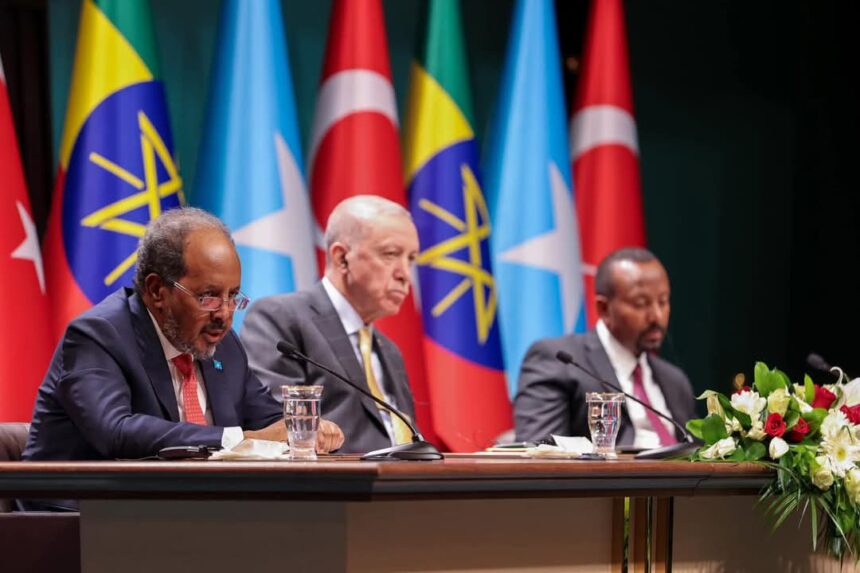Feature by Abdullahi Rush
Mogadishu (SONNA): The recent Ankara Agreement marks a historic diplomatic victory for Somalia, led by President Dr. Hassan Sheikh Mohamud. After two years of resistance, Ethiopia has finally acknowledged the territorial integrity of the Republic of Somalia by signing a document that eliminates the contentious term “ownership” that Ethiopia had been pushing for. This pivotal agreement, brokered by the Turkish government and witnessed by President Recep Tayyip Erdogan, signifies a momentous achievement in regional diplomacy.
President Dr. Hassan Sheikh Mohamud is celebrated for his staunch defense of Somali maritime rights and his resolute efforts to resolve maritime disputes with neighboring Kenya. Both conservative and opposition figures praise his persistent efforts to preserve Somali unity, exemplified by his support for Foreign Minister Ahmed Moallin Fiqi. Somali politicians widely acclaim this recent agreement as another testament to his diplomatic prowess.
Political commentator Prof. Hassan Sheikh lauded President Mohamud’s accomplishments, noting that “President Hassan Sheikh has twice saved the country from the dangers posed by the ambitions of the Ethiopian and Kenyan governments.” He highlighted the successful maritime case against Kenya and the defense of Somali waters from Ethiopian encroachment as significant milestones.
The Turkish-brokered agreement is seen as a critical step toward strengthening bilateral relations and fostering stability and cooperation in the Horn of Africa. The UAE’s foreign ministry issued a statement praising Turkey’s role and President Erdogan’s efforts in mediating the talks. The statement emphasized the importance of peaceful dispute resolution and reaffirmed the UAE’s commitment to promoting regional peace and stability.
Moussa Faki Mahamat, Chairperson of the African Union Commission, welcomed the Ankara talks, commending President Mohamud and Ethiopian Prime Minister Abiy Ahmed for their leadership and responsibility. He urged the immediate implementation of the agreement’s provisions and praised President Erdogan for his unwavering support and facilitation of the resolution process.
The United States also welcomed the agreement, recognizing it as a means to alleviate regional tensions resulting from Ethiopia’s previous attempts to gain access to the sea through Somaliland. The agreement ensures a reliable, secure, and sustainable maritime route for Ethiopia, under the sovereign authority of Somalia, thus addressing the longstanding dispute.
Somali Deputy Prime Minister Saleh Ahmed Jama hailed the Ankara Agreement as a return to adherence to international law and the principles of the African Union and the United Nations. Deputy Minister Abdirahman Yusuf Al-Adaala expressed gratitude for the united efforts of Somali citizens and leadership in defending the nation’s interests.
Ethiopian politician Jawhar Mohamed acknowledged the agreement as beneficial for Ethiopia, emphasizing that it negates the need for Ethiopia to have its own port on the Red Sea coast. Instead, Ethiopia will use Somali ports, adhering to international laws such as the United Nations Convention on the Law of the Sea.
The Ankara Agreement not only resolves a significant maritime dispute but also sets a precedent for future diplomatic engagements in the region. It underscores the importance of cooperation, international law, and the relentless pursuit of peaceful resolutions to conflicts. This landmark agreement is a testament to the power of diplomacy and the enduring commitment to regional stability.





